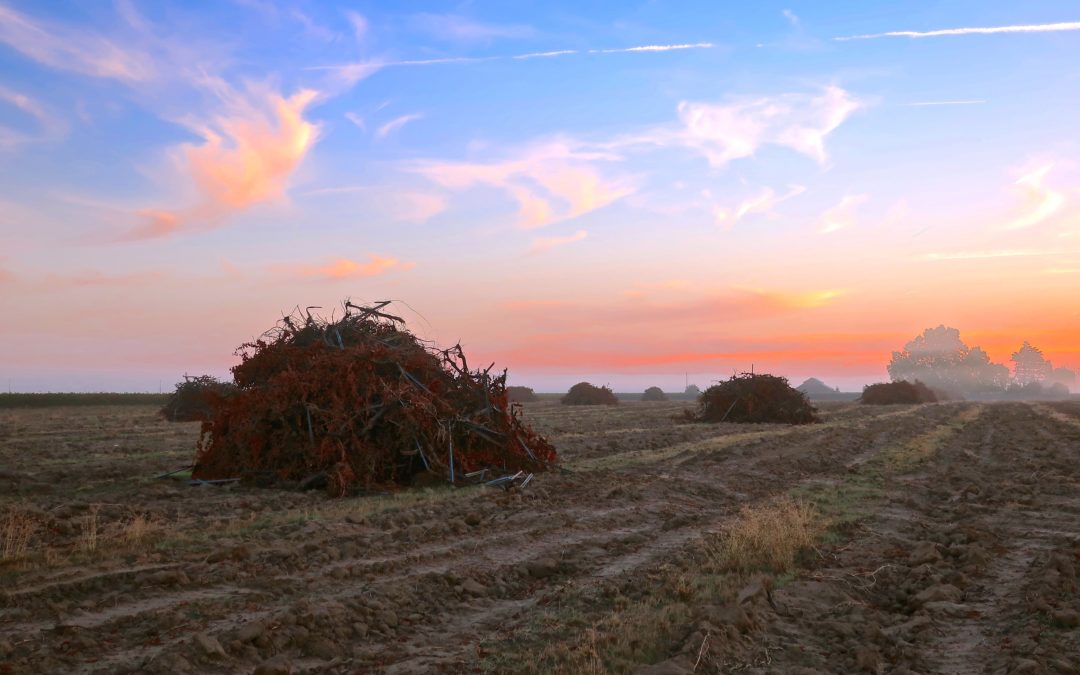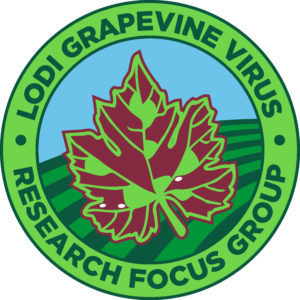JANUARY 8, 2020. BY STEPHANIE BOLTON, PhD, LODI WINEGRAPE COMMISSION.
LEAFROLL VIRUS APPROVED AS A NATURAL DISASTER ELIGIBLE FOR TAP FINANCIAL ASSISTANCE.
Today we have good news to share with California winegrape growers. If you’ve attended any of the Lodi Winegrape Commission’s virus outreach meetings in the last few years (or read any of our emails sent via the new grapevine virus email list-serve) you probably know that we are big fans of the USDA’s Farm Service Agency Tree Assistance Program.
The Tree Assistance Program, or TAP for short, provides financial assistance to eligible growers experiencing a natural disaster using funds from the Farm Bill. Grapevine red blotch virus was approved as an eligible plant disease in 2015. In October 2018, Dr. Alan Wei (who has experience working with growers to test vineyards for red blotch virus as part of an FSA application) spread the word that the Farm Service Agency may be willing to consider leafroll virus too.
Days later, I was in Turlock speaking about – you guessed it – mealybugs and viruses at the Tree & Vine Expo. I mentioned the Tree Assistance Program in the talk and a very nice couple, Connie Burk and Gordon Armstrong, came up to me afterwards. After a conversation about their bad luck with leafroll virus and this new information about TAP, they decided to apply. These growers understood that it would be a great deal of effort and time to go through the application process, and that they would have to appeal rejection decisions since leafroll was not currently approved. They also knew that their perseverance may not only help themselves but also other growers in the future.
Meanwhile, the growers and I wondered if the TAP financial assistance was even worth the effort of applying. What if a payout meant only $50 per acre? We were finally able to talk with a grower who had used the program for red blotch virus. He told us, “It’s definitely worth it!” Richard Lauchland, a gentleman who farms both in Lodi and in Paso Robles, found out about TAP from one of his Paso neighbors. Richard encouraged other growers to apply at a recent Lodi IPM Network Breakfast Meeting on December 3rd. Growers may apply for up to 1,000 acres per year and recoup 65% of certain removal and replanting costs.
After over a year of appeals and correspondence with helpful local FSA staff, we are happy to announce that the California State FSA has approved leafroll virus as an eligible natural disaster covered under the Tree Assistance Program.
We believe that this approval of leafroll virus is a crucial step in assisting farmers affected by leafroll virus, which can spread rapidly in areas with vine mealybugs and can decrease winegrape quality, lower yield, inhibit ripening, decrease a vineyard’s lifespan, and – as we have recently learned – contribute to the mystery/sudden vine collapse. This approval is also a critical step in reducing the amount of leafroll virus inoculum (or particles capable of infecting healthy grapevines) across the state.
Well done, FSA! A big thanks to Connie and Gordon who put in the effort to help us all.
To learn more about TAP, read their latest fact sheet (available HERE), check out their website (found easily by searching Google for “USDA FSA TAP”), or contact your local FSA office.
For San Joaquin County, here is the FSA contact information:
Joanne Gomez | Program Technician
U.S. Department of Agriculture | Farm Service Agency
Alameda/Calaveras/Contra Costa/San Joaquin County Office
7585 S Longe St Suite 100, Stockton CA 95206
(209) 337-2124 | eFax: (844) 206-7012
joanne.gomez@usda.gov
Eligibility (from the October 2019 TAP Fact Sheet)
To qualify for TAP, eligible orchardists and nursery tree growers must:
-
- Have suffered a qualifying tree, bush or vine loss in excess of 15 percent mortality for the stand (adjusted for normal mortality) due to an eligible natural disaster;
- Have owned the eligible trees, bushes and vines when the natural disaster occurred, but eligible growers are not required to own the land on which owned eligible trees, bushes and vines are planted;
and
-
- Replace eligible trees, bushes and vines within 12 months from the date the TAP application is approved. (An extension of up to 12 additional months may be possible.)
Additionally, a person or legal entity is ineligible for payment under TAP if the adjusted gross income (AGI) of the person or legal entity for the relevant tax years exceeds $900,000.
Tips for applying to TAP for financial assistance:
-
- Before you schedule your vineyard removal, read through all of the information and understand the time frames and eligibility requirements.
- Next, schedule an in-person meeting with your local FSA office. This is the type of thing that is best done in person. (BONUS: Once you are familiar with your local office, you will be ready to apply for other types of financial assistance such as the NRCS EQIP which offers financial assistance for conservation practices.)
- You have to be willing to follow the steps of the program but your patience and paperwork can really pay off – literally.
- A claim of loss due to leafroll or red blotch virus must be verified through testing performed at a commercial laboratory, and a minimum of 10 symptomatic vines must be tested from each block claimed to be infected. For a list of commercial virus testing labs, click HERE.
- In today’s grape market and with the nature of leafroll virus/mealybugs, you may want to consider good old crop rotation. There are options to still get financial assistance if you switch from grapevines to an FSA approved crop (contact your local office to find out what those crops are).
- Replanting only a section of a vineyard qualifies if the entire vineyard exceeds more than 18% mortality (or percent affected by red blotch or leafroll virus) – this may be the case for some farmers experiencing the mystery/sudden vine collapse.
To learn more about real-world virus management in “grower language” please attend our Mealybug & Virus Outreach Meeting on April 9, 2020, at the Stockton Cabral Ag Center. There are videos and more posted to lodigrowers.com/growereducation/virusresources/.
This California-based article was written for educational purposes only and we suggest contacting your local USDA FSA office for the most current information, eligibility requirements, and funding availability.
Written by Stephanie Bolton, PhD, Lodi Winegrape Commission, in December 2019. Reviewed by Joanne Gomez, Program Technician, USDA FSA – Stockton, California. Featured image used with permission courtesy of Randy Caparoso Photography.
Have something interesting to say? Consider writing a guest blog article!
To subscribe to the Coffee Shop Blog, send an email to stephanie@lodiwine.com with the subject “blog subscribe.”
To join the Lodi Growers email list, send an email to stephanie@lodiwine.com with the subject “grower email subscribe.”
To receive Lodi Grower news and event promotions by mail, send your contact information to stephanie@lodiwine.com or call 209.367.4727.
For more information on the wines of Lodi, visit the Lodi Winegrape Commission’s consumer website, lodiwine.com.



